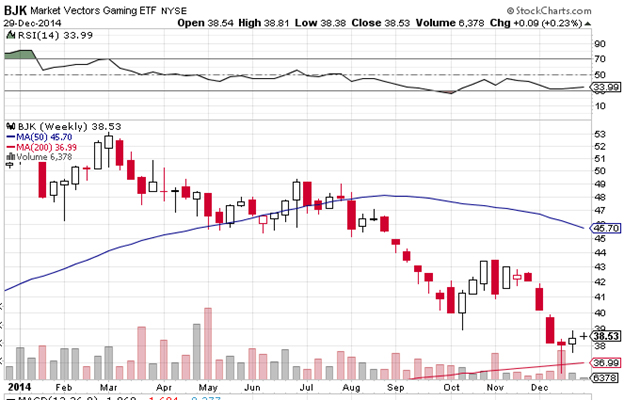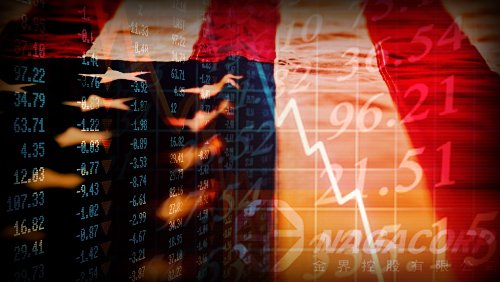2014 is ending with falling interest rates (though still comfortably above 2012 lows) plummeting price inflation, plunging oil prices, and a stock market at record highs. Except, sorry to say, for the gaming sector, which has fallen a sad 28% year to date as measured by the Market Vectors gaming ETF.

The gaming ETF’s fall this year has been heavily influenced by Macau’s lackluster performance in 2014. Its top holdings are Las Vegas Sands, Sands China, Wynn, Wynn Macau, Galaxy, and MGM, so it’s obvious that a poor Macau performance will negatively impact this index, with all the double Macau-weighting involved in its investments.
As for 2015, this could very well be the year when the money-printing chickens of the last 7 years come home to roost. Right now, central banks are celebrating the fact that price indexes are falling hard in the developed world (except Russia). Right now, prices are falling at an 8.7% annual rate as measured by the PriceStats Inflation Series. The record annual fall rate is 14.4% in 2008, and at the current rate of falling prices, we will reach that record fall rate in about 20 days. Much of this is due to a price war between OPEC and the nascent US shale oil industry. All that proud talk about the US finally becoming the largest oil producer on the planet has woken up the Saudis to glut the market and price out the competition.
Remember how all the presidential candidates in those debates in 2012 went on and on about bringing gas prices to below $2 a gallon? Well, now they’re there, and the US shale industry is going down with the oil tanker. Here’s a nice little ditty of President Obama in 2012 pontificating about how “bad policies” in the Bush era led to lower gas prices which destroy the economy. Obama is still president, I think, and gas is back at his “bad policy” target.
Not that I’m singling out Obama here. No politician knows anything about what controls gas prices. They only know how to make vague statements about “bad policies” and other platitudes with zero specifics.
In any case, what we have now going into 2015 is a situation of serious price deflation on the one hand, and a skyrocketing money supply on the other. According to the final money stock report of the year released just yesterday by the fed, M2 just pushed through $11.73T. At the end of last year it was $11.08T. Congratulations Ben and Janet, you have added $700B to the circulating money supply in 1 year.
Also of special note is something way out of the ordinary. On the final 2014 Aggregate Reserves data sheet released also yesterday, it shows the monetary base pushing through $4T again. Monetary base includes money supply plus excess reserves, and is a loose proxy for the Federal Reserve balance sheet. For some reason unknown to me, the monetary base increased by over $300B in the last two weeks, which is exceedingly strange considering the fact that QE is supposed to be over. If so, where did the $300B increase come from? Santa Claus? Somebody over there is printing lots more money without telling anybody about it.
Taken together, strong price deflation on one hand, and strong money supply increases – even continued money printing proper – on the other, this is the perfect setup for a continued boom in the US. Lower prices and a higher money supply will keep the money flows coming to Las Vegas, so now is the time to buy US based gaming stocks, especially with MGM closer to its lows than its highs this year.
With the boom, however, will come selected busts around the globe. First, closely watch the developments out of the Eurozone. The Greeks have, not surprisingly, not paid off a single cent of their massive 174% of GDP debt with their IMF bailout money. The bailout money is being used to pay off existing bonds in order that the Greeks be able to sell new bonds (AKA new debt) without being locked out of the market. In other words, the bailout money is being used to raise new debt. Lovely.
The Greek debt keeps rising, meanwhile, and this show is going to have to end sometime soon, probably in 2015. The Greeks could not elect a president yesterday, which means snap elections by the end of the month, which could see the Syriza anti-bailout party come to power by February. If that happens, Greece may finally default this year, which, among other things, will push up the bond yields of heavily indebted Eurozone countries to the breaking point.
From there, the European Central Bank will have two options. One, print like mad and bail out Italy, Spain, Portugal, and Ireland. Two, let them all default and all who hold their bonds take the losses. The first option will tank the Euro. The second will tank the European banking system. Say what you want about the UK, but at least they won’t be mired in this mess since they never joined the Euro.
Conclusion: Stick with British stocks near their lows with minimal exposure to Eurozone markets. Australia will be a great performer this year. Stay out of the Eurozone.
As for Russia, either they will be able to defend the Ruble successfully, or they won’t. It will be a tug of war between Forex ruble speculators and Russia’s central bank. The fuel for the central bank will be its Forex reserves it can sell in order to buoy the Ruble.

During the 1998 Asian Financial Crisis, Russia barely had any foreign reserves to boost its currency (see above). It later defaulted. While Russian forex reserves have dropped precipitously since the Ruble began crashing, Putin still has a lot of ammunition compared to what Yeltzin had in the late 90’s. My prediction is that Russia will come out of this OK, without defaulting, and from there Russian markets will rebound.
Look for companies investing in Russia, like Nagacorp, and slowly scale in for 2015.
As for China and Macau, continue to stay away. China has a great future ahead of it along with Macau, but not until after the big fall is complete. We are in the beginning stages of it, but not in the full swing yet. The Chinese economy has been too dependent on expanding bank credit for too long not to suffer when that credit is cut, and China does not want to be in Putin’s place having to defend a falling currency. It would rather weather a recession than risk the Yuan, which means Macau will have another disappointing year ahead at the very least.
In summary, for 2015, in the US, watch the money supply and price inflation. Buy companies with most of their operations within the US, but not companies with a very high debt level. Stay out of the Eurozone, but don’t shy away from the UK, especially UK companies heavily invested in Australia. Once the Ruble stabilizes, go long Russia. Continue to keep away from Macau.
